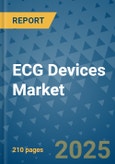Market Insights
Electrocardiogram devices, once limited to hospital settings, are now finding applications across a diverse range of environments - from remote villages to outer space. These devices are evolving from traditional diagnostic machines into compact, wearable tools that can transmit real-time data to healthcare providers. The demand for such portable devices is growing amid a sharp rise in CVDs, which remain the leading cause of death globally. Real-time monitoring of heart rhythms has emerged as a key tool for early detection, particularly for silent heart attacks which often go undiagnosed until damage is irreversible.The pandemic further highlighted the importance of remote healthcare. With hospitals overwhelmed, the use of portable ECG devices surged, and government agencies fast-tracked approvals for wearable and remote-monitoring ECG tools. Moving forward, integration of these devices in unique fields like space exploration and professional sports is likely to broaden their scope and impact.
Market Drivers
One of the primary drivers of the ECG devices market is the rising prevalence of cardiovascular diseases and the increasing necessity for early, precise diagnostics. The proliferation of wearable technology has also played a critical role. Companies are embedding ECG sensors into consumer devices like smartwatches, enabling users to monitor their cardiac health from the comfort of their homes. For instance, recent developments have shown how wearable ECG features were able to detect left ventricular dysfunction - an early sign of heart failure - with notable accuracy.In addition, growing awareness about silent heart attacks has led to increasing adoption of these devices in non-clinical environments. Technological innovation in ECG systems is being encouraged by global health organizations and medical societies, which now recommend regular ECG screenings for at-risk individuals.
Business Opportunity
New opportunities are rapidly emerging in the field of athletic health monitoring. Sudden cardiac deaths in athletes, although rare, have drawn attention to the need for routine ECG screenings before competitions. Sports governing bodies like FIFA have now made ECG testing mandatory during pre-participation assessments, creating a niche segment for high-performance, portable ECG devices.Similarly, space agencies such as NASA are deploying wearable ECG tools on missions to ensure astronaut health during prolonged spaceflights. These use real-time transmission to share data with Earth-based teams, offering insights into how cardiac performance is impacted in zero-gravity environments. These examples highlight how ECG technology is entering unconventional domains, paving the way for new revenue streams and market growth.
Region Analysis
In North America, particularly the United States, the ECG devices market is seeing rapid growth. This can be attributed to strong federal healthcare initiatives, including the Million Hearts® program, which aims to prevent a million heart attacks and strokes by 2027. Improved Medicare reimbursement policies are further encouraging healthcare providers to adopt advanced ECG systems. Additionally, telemedicine platforms in Canada are enabling patients to conduct at-home ECG tests and consult specialists remotely, which is especially impactful in underserved northern territories.In the Middle East and Africa, countries such as the United Arab Emirates and Qatar are ramping up investments in ECG technologies as part of broader health reforms. The UAE’s National Health Strategy 2050 has led to widespread adoption of smart diagnostic tools across public and private healthcare centers. Qatar is also investing heavily in ECG-based screening for high-risk populations, including those with diabetes and hypertension.
Asia Pacific is emerging as a key region, driven by healthcare digitization and government backing in countries like China and Japan. Chinese tech giants such as Tencent and Alibaba Health are collaborating with hospitals to deploy AI-integrated ECG monitoring platforms. Japan is also seeing a spike in the adoption of wearable ECG patches for long-term rhythm tracking, addressing the needs of its aging population.
Key Players
The ECG devices market features a highly competitive Analysis, with key players focusing on innovation, regional expansion, and strategic partnerships to gain market share. Prominent companies in the sector include:- GE Healthcare
- Koninklijke Philips N.V.
- Welch Allyn (Hill-Rom Company, Inc.)
- Schiller AG
- Fukuda Denshi Co. Ltd.
- Nihon Kohden Corporation
- Mortara Instrument, Inc.
- Spacelabs Healthcare, Inc.
- iRhythm Technologies Inc.
- ACS Diagnostics
- Medicomp Inc.
- Hemodynamics Company LLC
- Midmark Corporation
- Scottcare
- BPL Medical
- Contec
- RMS
- BTL Corporate
- EDAN Instruments, Inc.
- Viatom Technology Co., Ltd
Recent Developments
- In December 2024, DocGo Inc. expanded its partnership with SHL Telemedicine to introduce the SmartHeart® portable ECG device across its mobile healthcare units.
- In September 2024, OMRON Healthcare Korea launched a home-use device, OMRON Complete, that combines ECG and blood pressure measurement in a single tool.
- In May 2024, OMRON Healthcare India and AliveCor India announced a collaboration to enhance access to AI-based ECG technology, aimed at boosting cardiovascular awareness in the region.
Segmentation
By Product:
- ECG Resting System
- ECG Holter Monitoring System
- ECG Stress Testing System
- Cardiopulmonary Stress Testing System
By End User:
- Hospitals
- Diagnostic Centers
- Clinics
- Ambulatory Surgical Centers
By Region:
- North America
- Europe
- Asia Pacific
- Latin America
- Middle East and Africa
This product will be delivered within 1-3 business days.
Table of Contents
Companies Mentioned
- GE Healthcare
- Koninklijke Philips N.V,
- Welch Allyn (Hill- rom Company, Inc.),
- Schiller AG
- Fukuda Denshi Co. Ltd.,
- Nihon Kohden Corporation,
- Mortara Instrument, Inc.
- Spacelabs Healthcare, Inc.
- iRhythm Technologies Inc,
- ACS Diagnostics
- Medicomp Inc.
- Hemodynamics Company LLC
- Midmark Corporation
- Scottcare
- BPL Medical
- Contec
- RMS
- BTL Corporate
- EDAN Instruments, Inc.
- Viatom Technology Co., Ltd








